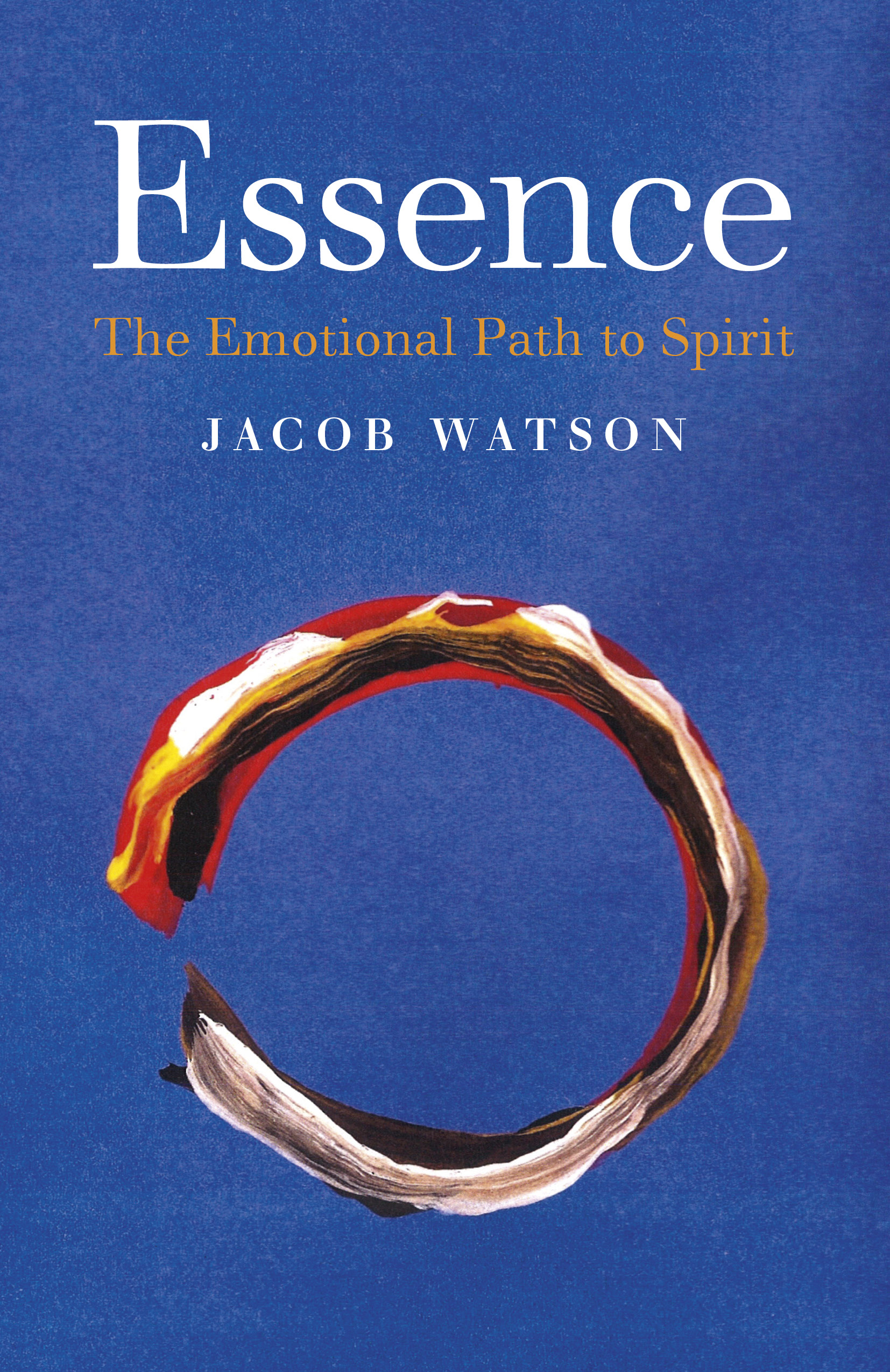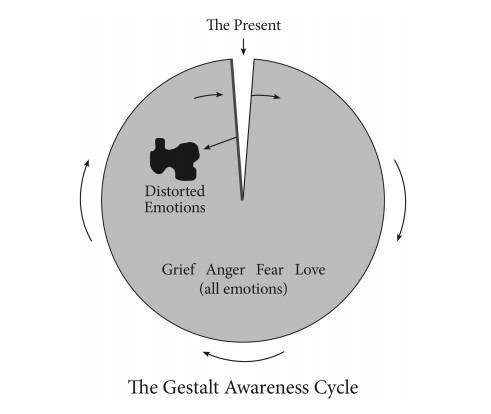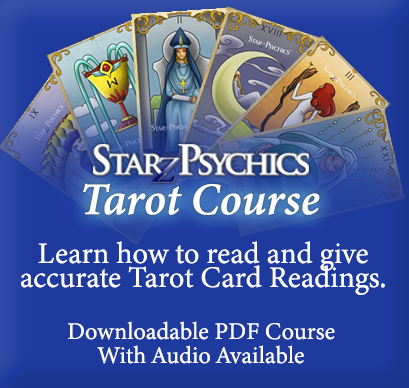- Home
- Editor's Notes
- Current Issue
- Riki Reflects
- Spiritual Traveler
- Starz Emporium
- Classifieds
- Advertise with Us
- Submissions
- Awards
- About Us
- Contact Us
The Gestalt Awareness Cycle
By Jacob Watson
 The Gestalt Awareness Cycle is a circle that represents our unconscious that contains all the natural emotions we have ever experienced. They are hidden in the darkness of time and ignorance. The thin slice out of the top represents the here and now, what we are aware of in the present moment. (I teach this model so much that some students began calling it Jacob’s Pie.) This is a model of health; the health is the movement of our natural emotions – one at a time – clockwise around up into the present, into the light of awareness. We are conscious of the emotion in the here and now. When one feeling pops out into the slice at the top that represents the present moment, and is identified, we have the ‘Aha’ experience: I know what I am feeling now. Though our feelings might come up quickly, one right after another, we have room for only one at time. This is helpful; we can recognize it, identify it, and express it.
 According to Gestalt therapy’s model of health, when a feeling is not known and expressed, it becomes toxic. When the feeling is known and expressed, the need to know and express it drops away, back into the unconscious. Thereby – and this is the punch line – we create space for the next feeling to come up into awareness and be expressed. Most of this feeling is inside, unconscious, while the expression, the externalization, is outside, conscious, as we put out into the world what was formerly locked away. Because every feeling longs to be felt and expressed, this movement to the slice of openness at the top – the present – is natural, organic and inevitable. In fact, the movement of feelings can define health. That is what feelings seek, every minute and over the years, movement and expression. In fact, feelings are so strong and persistent they will be felt and expressed in some form. If it’s not expressed as a natural emotion, a feeling will find its way out as a physical symptom. We now know that unexpressed grief may express as chronic coughing or colds: the fluid of tears showing up inside the body. Unexpressed anger sometimes manifests as heart disease. An unrecognized need for love may come as a series of unhealthy love affairs. Writers like Louise Hay, Caroline Myss and Joan Borysenko detail these possibilities. For me, an unrecognized, unexpressed feeling is like a persistent hand tapping on my shoulder. If I don’t give the feeling what it wants, acknowledgement and expression, the tapping gets more insistent. The feeling pulls more and more of my attention away from the present moment. If I ignore this feeling, over time it robs me of my ability to function in the present. The unexpressed feeling eventually will become raucous and demanding, and insist that I pay attention. The tapping on my shoulder says, “Hey, remember me, I’m your sadness about how your father treated you.” That’s what the sadness, or any emotion, wants: attention, acknowledgement, and expression, conscious expression. Conscious means, “I know this is sadness.” If I don’t say to the sadness, “OK, I hear you, you’re right. I do feel sad about that,” the sadness will pounce on every natural loss I feel, in this case about men and authority, and grow larger and more insistent. Eventually it will become a 2” x 4” club whacking me on my head emotionally until I do pay attention. Some people think they can simply ‘channel’ their anger into physical activity such as sports or exercise. But for healing to occur, consciousness is required. We must be conscious that we have the feeling. We may or may not know its cause – that part is optional. Consciousness and externalization are not optional. There are times when the present situation or the people around me do not feel safe enough for me to be vulnerable and share my intimate emotions. In this case, it is healthy not to express my feelings. I must acknowledge that I feel them, at least to myself, but then I can put them on a metaphorical shelf. I promise them I will get back to them soon, within days. Then when it is safe, I can invite them into my present awareness and give them what they seek: expression. We can plan a Shelf Day when we create the time, space and energy to reach up to our ‘shelf’ and invite whatever feelings we’ve put there to come down so that we can express them. A benefit of doing this is to remind our self that we have control over whether, when, how, and to whom we express our feelings. It is a great gift to our self to acknowledge and express a long-suppressed emotion. First this act frees up energy, and second, it keeps the awareness moving, and as we’ve seen, this movement is a key to health. Another quality of health is the recognition that the process of awareness and movement is more important than the content of what we are aware of. The expression is more important than what we express. This goes against the messages from our reductionist, ego-based culture, which wants to know not only what the feeling is but also why we feel it. The culture wants a rationale for the story, a justification. To try to satisfy the culture’s obsession with exactly what the feeling is, and why we feel it, propels us quickly up into our heads. Our mind wants to fix the ‘problem’, to find a solution. Our intellect tries to figure it out. And if we can’t come up with exactly what the feeling is or a valid reason why we feel it, suddenly we have lost permission to feel it. But it is our responsibility to give ourselves the permission to do what we need to do to be healthy – feel our natural emotions that are tapping on our shoulder. Sometimes that means trusting the validity of the feeling without knowing where it came from. That is the beauty and power, even the purity, of a natural emotion. To honor the feeling, to be healthy, we give it expression. Rev. Jacob Watson, D.Min. is an interfaith minister and spiritual teacher. He helped start Collins Brook School, the Center for Grieving Children and the interfaith Chaplaincy Institute of Maine. Since 1985 he has been a Hospice Volunteer, Chaplain, Board member, trainer and supervisor. He was a grief counselor and a senior staff member of the Elisabeth Kubler-Ross Center, leading Life, Death and Transition workshops nationally and overseas. He is the author of Essence: The Emotional Path to Spirit, and devotes his life to teaching, writing and prayer. Website: revjacobwatson.com |
Share this article with friends!
|
Copyright © 1998 - 2026 Mystic Living Today All rights, including copyright, in the content of these Mystic Living Today web pages are owned or controlled for these purposes by Planet Starz, Inc. Terms of Service Disclaimer and Legal Information For questions or comment, contact Starzcast@mysticlivingtoday.com. Reproduction of this page in any form is not allowed without permission of the author and the owner of this site. All material on this web site, including text, photographs, graphics, code and/or software, are protected by international copyright and trademark laws. Unauthorized use is not permitted. You may not modify, copy, reproduce, republish, upload, post, transmit or distribute, in any manner, the material on this web site. Unless permissions is granted. |



